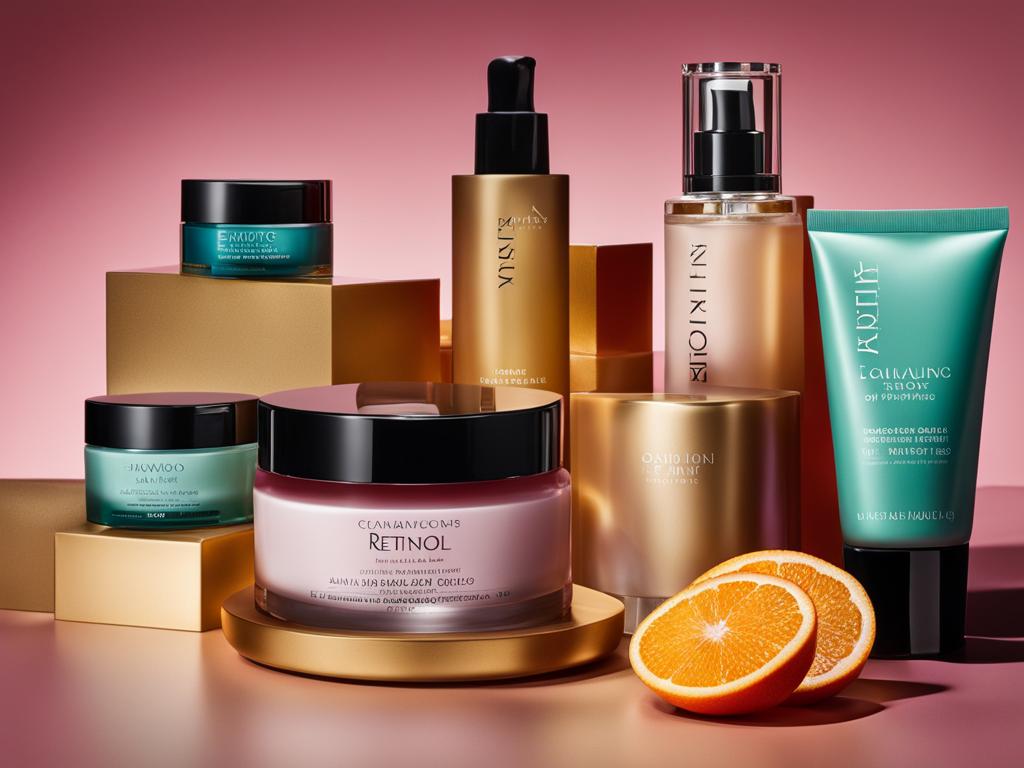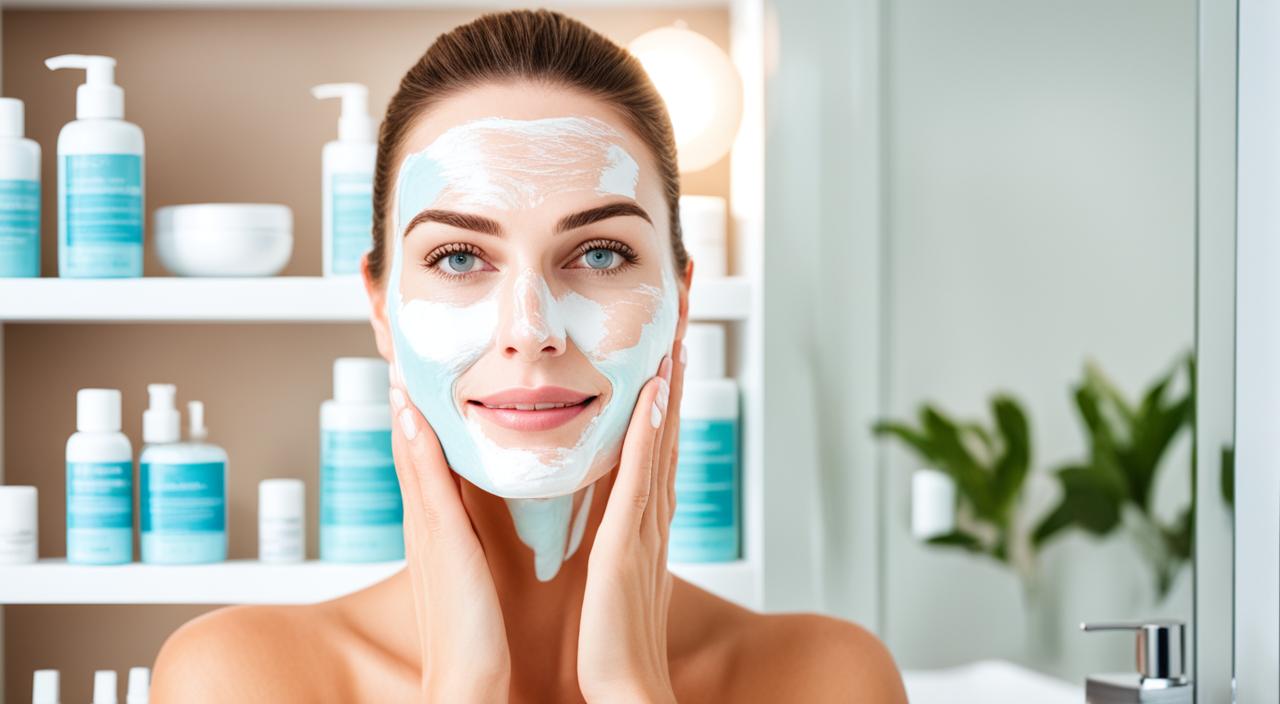Master Your Anti Aging Skincare Routine For Youthful Skin

Anti aging skincare routine : Aging is a natural part of life, but taking care of your skin can help slow down the aging process and maintain a youthful appearance. In this article, we will discuss the best practices for an anti-aging skincare routine, including the use of anti-aging products and natural remedies. Whether you’re in your 30s, 40s, or beyond, these tips will help you master your anti-aging skincare routine and regain youthful radiance.
Key Takeaways:
- Follow a consistent anti-aging skincare routine to maintain youthful skin.
- Use anti-aging products and natural remedies to slow down the aging process.
- Choose the best anti-aging skincare products for your specific needs.
- Protect your skin from environmental damage and sun exposure.
- Adopt a healthy lifestyle and consult with a dermatologist for personalized advice.
The Importance of Collagen and Skincare
Collagen and elastin are key proteins in the skin that play a crucial role in maintaining its structure and elasticity. As we age, the production of collagen and elastin naturally decreases, leading to the formation of fine lines, wrinkles, and sagging skin. Implementing an effective anti-aging skincare routine is essential to promote collagen and elastin production and preserve a youthful complexion.
Understanding the secrets to target fine lines and wrinkles can help you keep your skin looking smooth and plump. Incorporating anti-aging ingredients into your skincare regimen can make a significant difference. Ingredients such as retinol, hyaluronic acid, and peptides have been proven to boost collagen production and improve the overall texture and appearance of the skin.
Moreover, it’s important to address other factors that contribute to collagen breakdown. Environmental stressors, such as sun exposure, pollution, and smoking, can accelerate collagen and elastin degradation, resulting in premature aging. By protecting your skin from these harmful factors and nourishing it with collagen-boosting skincare products, you can help maintain a youthful and radiant complexion.
Building a Daily Skincare Routine
A daily skincare routine is the foundation of any effective anti-aging regimen. It involves a series of steps that cleanse, nourish, and protect your skin from environmental damage. Understanding your skin type is crucial in choosing the right products for your specific needs. Here, we discuss the importance of each step in a daily skincare routine and highlight key ingredients that can help combat the signs of aging.
Step 1: Cleansing
Cleansing is essential for removing dirt, oil, and impurities from your skin. Choose a gentle cleanser that suits your skin type – whether it’s oily, dry, or combination. Look for ingredients like glycolic acid or salicylic acid for gentle exfoliation and deep cleansing. Massage the cleanser onto damp skin in circular motions, then rinse thoroughly with lukewarm water.
Step 2: Moisturizing
Moisturizing is crucial for maintaining the hydration and elasticity of your skin. Opt for a moisturizer that is suited to your skin type – whether it’s a lightweight lotion, a rich cream, or a gel. Look for ingredients like hyaluronic acid, which helps attract and retain moisture, and ceramides, which help strengthen the skin barrier. Apply the moisturizer evenly over your face and neck, focusing on areas that tend to be dry.
Step 3: Serum and Targeted Treatments
Serums are concentrated formulations that deliver potent ingredients deep into the skin. Look for serums that contain ingredients like retinol or vitamin C, which can help reduce the appearance of fine lines, wrinkles, and age spots. Apply a few drops of serum onto clean skin and gently pat it in until fully absorbed. You can also incorporate targeted treatments like eye creams or spot treatments, depending on your specific concerns.
Step 4: Sunscreen
Sunscreen is a crucial step in any anti-aging skincare routine. It helps protect your skin from the harmful effects of UVA and UVB rays, which can lead to premature aging, dark spots, and sunburn. Choose a broad-spectrum sunscreen with an SPF of at least 30 and apply it generously to all exposed areas of your skin. Reapply every two hours, or more frequently if you’re sweating or swimming.
Targeting Specific Aging Concerns
Aging concerns can vary from person to person, but there are common issues that many people face, such as dryness, fine lines and wrinkles, dark spots, enlarged pores, and an uneven complexion. It is important to address these specific concerns in your anti-aging skincare routine to achieve the best results. Here are some effective anti-aging products and techniques to target these concerns:
Hydration
Keeping your skin hydrated is essential for maintaining a youthful appearance. Look for moisturizers and serums that contain ingredients like hyaluronic acid, which helps to attract and retain moisture in the skin. Hydrated skin appears plumper and more radiant, reducing the appearance of fine lines and wrinkles.
Renewal and Exfoliation
Exfoliation is key to removing dead skin cells and promoting cell turnover, revealing fresh, rejuvenated skin. Consider incorporating chemical exfoliants like alpha-hydroxy acids (AHAs) or beta-hydroxy acids (BHAs) into your skincare routine. These ingredients help to smooth the skin’s texture, fade dark spots, and minimize the appearance of pores.
Targeted Treatments
For specific concerns like fine lines and wrinkles, look for products that contain ingredients like retinol. This vitamin A derivative has been proven to stimulate collagen production and reduce the appearance of wrinkles. Additionally, brightening treatments containing ingredients like vitamin C can help to even out your complexion and fade dark spots caused by sun damage.
By addressing these specific aging concerns, you can improve the overall appearance and texture of your skin, helping you achieve a more youthful and radiant complexion.

Ingredients to Look for in Anti-Aging Skincare Products
When it comes to choosing the right skincare products for anti-aging, it’s important to pay attention to the ingredients. Certain ingredients have been proven to have powerful anti-aging effects on the skin. Here are some key ingredients to look for when selecting your moisturizer, serum, or other anti-aging treatments:
- Antioxidants: Antioxidants help protect the skin from free radicals, which can cause premature aging. Look for ingredients like vitamin E, green tea extract, or resveratrol.
- Glycolic Acid: Glycolic acid is an exfoliating ingredient that can help improve the texture of your skin and reduce the appearance of fine lines and wrinkles. It works by removing dead skin cells and stimulating collagen production.
- Hyaluronic Acid: Hyaluronic acid is a powerful hydrating ingredient that can help plump up the skin and reduce the appearance of fine lines and wrinkles. It works by attracting and retaining moisture in the skin.
- Ceramide: Ceramides are naturally occurring lipids in the skin that help maintain its barrier function. They help lock in moisture and keep the skin hydrated, which is essential for combating signs of aging.
- Vitamin C Serum: Vitamin C is a potent antioxidant that can brighten the skin, even out the complexion, and stimulate collagen production. Look for a serum with a high concentration of vitamin C for maximum effectiveness.
By incorporating skincare products that contain these anti-aging ingredients into your daily routine, you can effectively target signs of aging and achieve a more youthful complexion.
“The right combination of ingredients can make a significant difference in the overall effectiveness of your anti-aging skincare routine.”
However, it’s important to note that everyone’s skin is unique, and what works for one person may not work for another. It’s always a good idea to do a patch test before applying a new product to your entire face and to consult with a dermatologist if you have any specific concerns or sensitivities.
| Ingredient | Benefits |
|---|---|
| Antioxidants | Protects against free radicals and premature aging |
| Glycolic Acid | Exfoliates and stimulates collagen production |
| Hyaluronic Acid | Hydrates and plumps up the skin |
| Ceramide | Maintains skin barrier and locks in moisture |
| Vitamin C Serum | Brightens skin, evens out complexion, and stimulates collagen production |

The Importance of Sun Protection
Sun protection is a vital step in any anti-aging skincare routine. UV rays from the sun can cause damage to the skin, leading to dark spots, wrinkles, and premature aging. It is essential to incorporate sunscreen into your daily skincare regimen to shield your skin from harmful UV rays and maintain a youthful complexion.
Sunscreen: One of the key elements of sun protection is sunscreen, which acts as a barrier between your skin and the sun’s harmful rays. When choosing a sunscreen, look for a broad-spectrum formula that protects against both UVA and UVB rays. It is also crucial to select a product with a high sun protection factor (SPF). SPF 30 or higher is recommended to ensure adequate protection.
Broad-spectrum sunscreen: Broad-spectrum sunscreen provides protection against both UVA and UVB rays. UVA rays can penetrate deep into the skin, leading to premature aging and wrinkles, while UVB rays cause sunburn and contribute to the development of skin cancer. By using a broad-spectrum sunscreen, you can safeguard your skin from both types of damaging rays.
Regularly applying sunscreen is essential, even on cloudy days or during the winter months when the sun’s rays are still present. Make sure to apply sunscreen generously to all exposed areas of the skin, including the face, neck, and hands. Reapply every two hours or more frequently if sweating or swimming.

By incorporating sun protection into your daily routine, you can prevent further skin damage and maintain a youthful complexion. Remember, protecting your skin from the sun is not only crucial for anti-aging purposes but also for overall skin health and reducing the risk of skin cancer.
The Role of Diet and Lifestyle in Anti-Aging
Achieving youthful skin goes beyond just skincare products. Your diet and lifestyle choices play a significant role in maintaining skin health and fighting the signs of aging. By incorporating healthy habits into your routine, you can rejuvenate your skin from within.
First and foremost, a balanced diet is key to supporting skin health. Include antioxidant-rich foods like berries, leafy greens, and nuts in your meals. These delicious options help protect your skin from free radicals and promote elasticity. Additionally, staying hydrated is crucial for maintaining plump and youthful-looking skin. Make sure to drink enough water throughout the day to keep your skin glowing from the inside out.
Regular exercise is another essential aspect of an anti-aging lifestyle. Engaging in physical activity increases blood flow, delivering oxygen and nutrients to your skin cells. Exercise also helps reduce stress, a major contributor to premature aging. So, whether it’s a brisk walk, yoga, or a full workout, make sure to incorporate exercise into your daily routine.
Incorporating these diet and lifestyle changes into your anti-aging journey will enhance the effectiveness of your skincare routine and promote overall skin health. Remember, taking care of your skin is not just about what you put on it but also about how you nourish and treat your body.
The Role of Diet and Lifestyle in Anti-Aging: Key Takeaways
- A balanced diet rich in antioxidants, including fruits, vegetables, and nuts, supports skin health.
- Staying hydrated by drinking enough water helps maintain plump and youthful-looking skin.
- Regular exercise increases blood flow and reduces stress, contributing to a healthy and radiant complexion.

References:
- Lynn, D. D., Umari, T., & Dunnick, C. A. (2016). Emerging drugs for the treatment of acne. Expert opinion on emerging drugs, 21(3), 293–302. doi:10.1080/14728214.2016.1206070
- Schagen, S. K., Zampeli, V. A., Makrantonaki, E., & Zouboulis, C. C. (2012). Discovering the link between nutrition and skin aging. Dermato-endocrinology, 4(3), 298–307. doi:10.4161/derm.22876
- Tan, M. H., Spencer, J. M., & Pires, L. M. (2017). Topical Colloidal Oatmeal: History, Chemistry, and Clinical Properties. Journal of drugs in dermatology : JDD, 16(7), 667–672.
Professional Skincare Advice
When it comes to your anti-aging skincare routine, seeking professional advice from a board-certified dermatologist can make a significant difference. Dermatologists are experts in skin health and can provide personalized recommendations based on your specific needs and concerns. Whether you’re looking to address fine lines and wrinkles, uneven complexion, or other aging-related issues, a dermatologist can guide you in selecting the right products and treatments.
One of the essential aspects of consulting a dermatologist is the thorough skin analysis they can provide. Using advanced techniques and equipment, they can assess your skin’s condition, identify specific concerns, and recommend targeted solutions. This analysis allows for a more precise and tailored approach to your skincare routine, optimizing its effectiveness.
Professional treatments recommended by dermatologists can also complement your at-home routine. These treatments, such as chemical peels, laser therapy, or microdermabrasion, can target deep-set wrinkles, hyperpigmentation, and other advanced signs of aging that may be challenging to treat with over-the-counter products alone. Dermatologists can administer these treatments safely and provide post-treatment care to ensure optimal results.
Skincare recommendations from a dermatologist are based on their in-depth knowledge of skincare ingredients and their efficacy. They can guide you in choosing products with ingredients proven to address specific concerns, such as retinol for fine lines and wrinkles, hyaluronic acid for hydration, or antioxidants for overall skin health. These recommendations can save you time and money by helping you avoid trial and error with various products.
Why Choose a Board-Certified Dermatologist?
When seeking professional skincare advice, it’s crucial to choose a board-certified dermatologist. Board certification ensures that the dermatologist has undergone extensive training, passed rigorous examinations, and meets the highest standards of professionalism and competence. By selecting a board-certified dermatologist, you can have confidence in their expertise and trust their recommendations for your anti-aging skincare journey.
Table 8.1: Comparison of Professional Skincare Advice versus Self-Research
| Professional Skincare Advice | Self-Research | |
|---|---|---|
| Expert Analysis | Thorough skin analysis to identify specific concerns. | Relying on general information and anecdotal evidence. |
| Personalized Recommendations | Customized skincare routine based on individual needs. | Choosing products based on trial and error. |
| Advanced Treatments | Access to professional treatments for advanced signs of aging. | Limitations to over-the-counter products. |
| In-Depth Knowledge | Expert understanding of skincare ingredients and their effectiveness. | Relying on general product descriptions and marketing claims. |
By consulting a board-certified dermatologist, you can ensure that your anti-aging skincare routine is based on professional expertise and tailored to your unique needs. Their analysis, recommendations, and access to advanced treatments can take your skincare journey to the next level, helping you achieve the youthful and radiant skin you desire.
Natural Anti-Aging Remedies
Apart from commercial skincare products, natural remedies can also be beneficial in the fight against aging. Incorporating these remedies into your skincare routine can provide additional nourishment and support for youthful-looking skin. Here are some effective natural remedies to consider:
DIY Skincare
Creating your own skincare products at home can be a fun and cost-effective way to pamper your skin. DIY face masks, scrubs, and serums allow you to control the ingredients and tailor them to your skin’s needs. For example, a DIY face mask using ingredients like honey, yogurt, and turmeric can help hydrate and brighten your complexion.
Essential Oils
Essential oils are concentrated plant extracts that possess various skincare benefits. Incorporating essential oils into your skincare routine can help nourish and rejuvenate your skin. For example, lavender oil has calming properties and can soothe sensitive skin, while rosehip oil is rich in antioxidants and can help improve the appearance of fine lines and wrinkles.
Collagen-Boosting Foods
Your diet plays a significant role in the health and appearance of your skin. Consuming collagen-boosting foods can help promote collagen production and improve skin elasticity. Some examples of collagen-boosting foods include bone broth, leafy greens, citrus fruits, and berries. These foods are rich in antioxidants, vitamins, and minerals that support skin health.
| DIY Skincare Recipes | Essential Oils | Collagen-Boosting Foods |
|---|---|---|
| – Honey, yogurt, and turmeric face mask | – Lavender oil for calming sensitive skin | – Bone broth for collagen production |
| – Oatmeal and honey exfoliating scrub | – Rosehip oil for reducing fine lines and wrinkles | – Leafy greens for essential vitamins and minerals |
| – Green tea toner for antioxidant benefits | – Frankincense oil for anti-aging properties | – Citrus fruits for boosting collagen synthesis |
These natural remedies can complement your existing skincare routine and provide additional support for anti-aging benefits. However, it’s important to note that natural remedies may not have the same potency as commercial skincare products. If you have specific skin concerns or require more intensive treatments, consulting a dermatologist is recommended.
By incorporating natural remedies into your anti-aging skincare routine, you can unlock the power of nature and enhance the health and vitality of your skin. Experiment with DIY recipes, explore the benefits of essential oils, and nourish your skin from within with collagen-boosting foods.

Conclusion
Mastering your anti-aging skincare routine is key to achieving and maintaining youthful skin. By following the best practices discussed in this article, including building a daily skincare routine, targeting specific aging concerns, and incorporating effective ingredients, you can improve the appearance and texture of your skin. Remember to prioritize sun protection by wearing broad-spectrum sunscreen daily to prevent sun damage and premature aging.
Additionally, adopting a healthy lifestyle, including a balanced diet rich in antioxidants and regular exercise, can further support the health and vitality of your skin. Consider seeking professional skincare advice from a board-certified dermatologist for personalized recommendations and treatments.
While commercial skincare products are beneficial, don’t forget to explore natural remedies as well. DIY skincare recipes, essential oils, and collagen-boosting foods can complement your anti-aging routine and provide additional benefits for youthful-looking skin.
Start implementing these tips today to embark on your journey to youthful and radiant skin. Remember that consistency and patience are key; results may take time, but the efforts will be worth it in the end. Take care of your skin, embrace the aging process, and enjoy the confidence that comes with looking and feeling your best.
FAQs
Q: What are the essential steps in an anti-aging skincare routine?
A: The essential steps in an anti-aging skincare routine include cleansing, using an antioxidant serum, applying a moisturizer, using SPF during the day, and incorporating targeted treatments for specific concerns like fine lines or dark circles.
Q: How can retinol benefit my anti-aging skincare routine?
A: Retinol is known for its ability to renew the skin and reduce visible signs of aging such as fine lines, wrinkles, and uneven skin tone. It can help improve the appearance of skin texture and stimulate new collagen production.
Q: What is the role of vitamin C in an anti-aging skincare routine?
A: Vitamin C is an antioxidant that helps protect the skin from environmental damage, brightens the skin, and helps reduce the appearance of dark spots and sun damage. It also helps to promote collagen production for firmer, youthful-looking skin.
Q: How should I choose a cleanser for my anti-aging skincare routine?
A: Look for a gentle facial cleanser that effectively removes impurities without stripping the skin of its natural oils. Opt for a cleanser that addresses specific concerns such as hydrating cleansers for drier skin or exfoliating cleansers for smoother skin texture.
Q: Why is SPF important in an anti-aging skincare routine?
A: SPF helps protect the skin from the damaging effects of UV rays, which can accelerate the aging process and lead to fine lines, wrinkles, and dark spots. It is crucial for preventing sun damage and maintaining youthful-looking skin.
Q: What are some common anti-aging ingredients to look for in skincare products?
A: Some common anti-aging ingredients to look for in skincare products include hyaluronic acid, retinol, vitamin C, niacinamide, peptides, and antioxidants like green tea extract or resveratrol.
Q: How can I personalize my anti-aging skincare routine based on my age?
A: In your 30s, focus on prevention and hydration. In your 40s, consider incorporating more targeted treatments for specific concerns. It’s important to adjust your skincare routine to address the changing needs of your skin as you age.
Q: What role does hyaluronic acid play in an anti-aging skincare routine?
A: Hyaluronic acid hydrates the skin and helps maintain its moisture balance, plumping the skin to reduce the appearance of fine lines and wrinkles. It is an effective daily moisturizer that helps refine the tone and texture of the skin.
Q: Why is a personalized skincare routine important for anti-aging?
A: A personalized skincare routine allows you to tailor your products and treatments to address your specific skin concerns, such as dryness, fine lines, or uneven skin tone. This targeted approach can yield more effective results for anti-aging.
Q: What should I consider when choosing an eye treatment for anti-aging?
A: When choosing an eye treatment for anti-aging, look for products that target specific concerns such as reducing puffiness, diminishing dark circles, and addressing fine lines around the eyes. Consider options like eye creams with retinol, peptides, or vitamin C for effective results.





